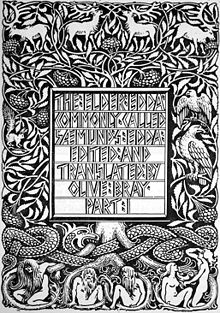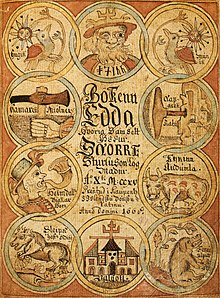Edda
| Part of a series on |
| Old Norse |
|---|
 |
| WikiProject Norse history and culture |
"Edda" (
The Edda has been criticized for imposing Snorri Sturluson’s own Christian views on Norse mythology. In particular the clean-cut explanation of what happens to a soul after death as understood in the Edda contradicts other sources on death in Norse mythology.[1]
Etymology
At least five hypotheses have been suggested for the origins of the word edda:
- One hypothesis holds that it is identical to a word that means "great-grandmother" appearing in the Eddic poem Rígsþula.[2] The word could stem from the Sanskrit term veda ("knowledge").[3]
- Another hypothesis holds that edda derives from Old Norse óðr, "poetry".[citation needed]
- A third, proposed in 1895 by Eiríkr Magnússon, is that it derives from the Icelandic place name Oddi, site of the church and school where students, including Snorri Sturluson, were educated.[4]
- A fourth hypothesis—the derivation of the word Edda as the name of Snorri Sturluson's treatise on poetry from the Latin edo, "I compose (poetry)", by analogy with kredda, "superstition", from Latin credo, "creed"—is now widely accepted, although this acceptance might stem from its agreement with modern usage rather than historical accuracy.[5]
- The fifth hypothesis is based on the past fashion of giving Icelandic manuscripts bird titles. Such are the legal codes Grágás 'grey goose', Gullfjǫðr 'gold feather (quill?)', and Hryggjar-stykki 'a kind of duck'. Perhaps Edda was also one of such titles: Edda would be an appropriate 'pet name' of æðr (pronounced as [æ:ðr] f.) 'eider duck'. Then, Edda meant 'little eider duck' (an analog of Grágás).[6]
The Poetic Edda

The Poetic Edda, also known as Sæmundar Edda or the Elder Edda, is a collection of
It consists of two parts. The first part has 10 songs about gods, and the second one has 19 songs about heroes.
The Codex Regius was written in the 13th century, but nothing is known of its whereabouts until 1643, when it came into the possession of
Bishop Brynjólfur sent the Codex Regius as a present to King
The Prose Edda

The Prose Edda, sometimes referred to as the Younger Edda or Snorri's Edda, is an
It was written by the Icelandic scholar and historian Snorri Sturluson around 1220. It survives in four known manuscripts and three fragments, written down from about 1300 to about 1600.[7]
The Prose Edda consists of a Prologue and three separate books: Gylfaginning, concerning the creation and foretold destruction and rebirth of the Norse mythical world; Skáldskaparmál, a dialogue between Ægir, a Norse god connected with the sea, and Bragi, the skaldic god of poetry; and Háttatal, a demonstration of verse forms used in Norse mythology.
See also
References
- ^ McCoy, Daniel. "Death and the Afterlife". Norse Mythology. Retrieved 2023-06-01.
- ^ Snorri Sturluson. The Prose Edda: Tales from Norse Mythology, translated by Jean I. Young (University of California Press, 1964), p. 8.
- ISBN 9780911500721. p. 20:
Edda means 'great-grandmother' and, by extension of meaning, 'matrix', suggesting 'world mother.' The word is apparently derived from veda, the Hindu scriptures or sacred vidyā (knowledge, from vid, to know, to perceive) from which stem the German wissen, the Swedish veta, and the old English wit — all words which mean 'to know.'
- ^ Liberman, Anatoly (1996). "Ten Scandinavian and North English Etymologies". Alvíssmál. 6: 63–98.
- ^ Oxford Dictionary of the Middle Ages (2010) under "Snorri Sturluson"
- ISBN 9785895260272.
- ISBN 978-0-8020-9801-6. Retrieved 17 December 2012.
External links
- . The American Cyclopædia. 1879.
- Gosse, Edmund William (1878). . Encyclopædia Britannica. Vol. VII (9th ed.). pp. 649–651.
- Gosse, Edmund William (1911). . Encyclopædia Britannica. Vol. 8 (11th ed.). pp. 921–922.
